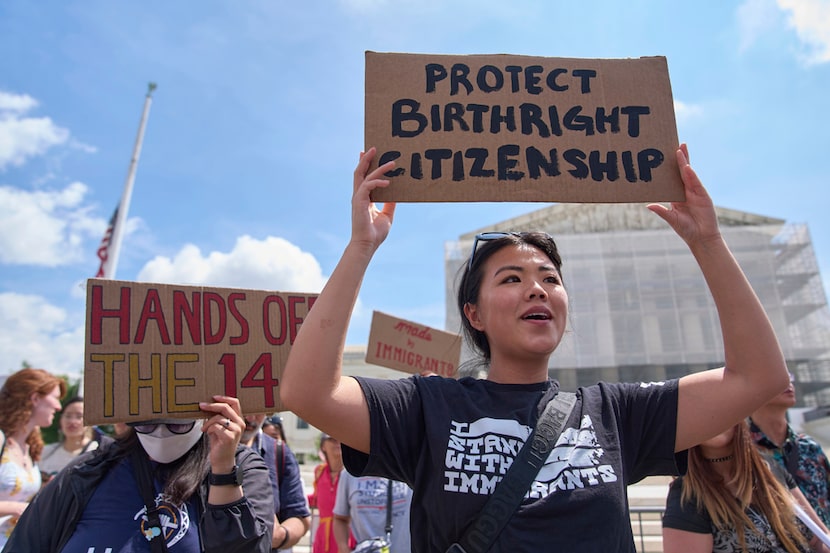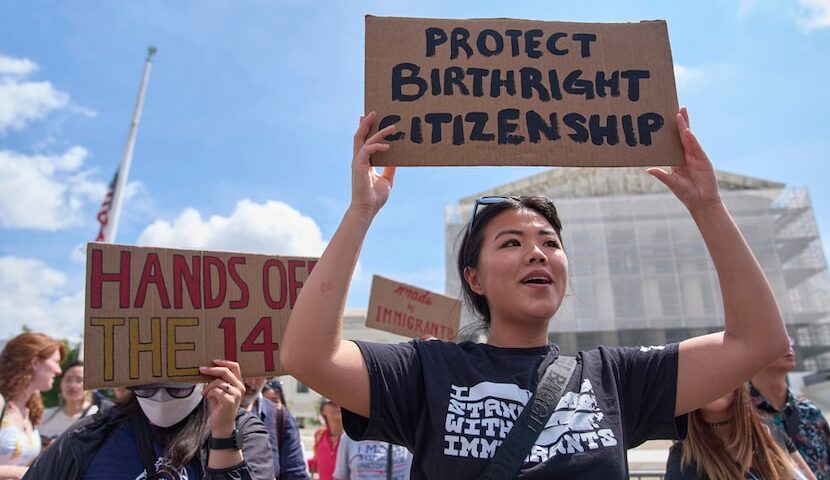The gloves came off, but justices got the decision right.
 Of the many U.S. Supreme Court opinions issued on the term’s final day, June 27, the one receiving the most attention has been Trump vs. CASA Inc., which involved a challenge against the president’s executive order on birthright citizenship, which was enjoined against everyone in the nation, not just against the plaintiffs. In a 6-3 opinion authored by Justice Amy Coney Barrett, the Supreme Court held that federal district court judges’ injunctions lack the power to stop enforcement of orders beyond those persons named as plaintiffs.
Of the many U.S. Supreme Court opinions issued on the term’s final day, June 27, the one receiving the most attention has been Trump vs. CASA Inc., which involved a challenge against the president’s executive order on birthright citizenship, which was enjoined against everyone in the nation, not just against the plaintiffs. In a 6-3 opinion authored by Justice Amy Coney Barrett, the Supreme Court held that federal district court judges’ injunctions lack the power to stop enforcement of orders beyond those persons named as plaintiffs.
The case produced six opinions, suggesting that the court considered it to be among the most important cases of its last term. Given that Justice Sonia Sotomayor took a full 20 minutes to read her dissenting opinion aloud from the bench, and her and Justice Ketanji Brown Jackson’s dissents covered 66 pages, the three justices on the court who opposed the majority opinion clearly believe that CASA’s holding on universal injunctions that apply to everyone is a major blow to the balance of power between our federal government’s judicial and executive branches.
President Donald Trump’s statement following the issuance of the opinion to the effect that it constituted a “monumental victory for the Constitution, the separation of powers, and the rule of law” surely ratcheted up the ire of Sotomayor, Jackson and Justice Elena Kagan.
Plaintiffs who claim to represent everyone and seek universal injunctions to nullify executive orders have been substantially more numerous during Trump’s second term than ever before. Given the CASA case’s decision, those attempting to obtain them from federal courts in the future should have little chance of success.
In his concurring opinion, Justice Samuel Alito pointed out that after the CASA holding, plaintiffs seeking to stop enforcement of executive orders on behalf of the entire country in the future may consider pursuing class action litigation, claiming that all Americans constitute a “class.”
It didn’t take long for Justice Alito’s concern to turn into a real lawsuit. On Thursday, the A.C.L.U. brought a class action lawsuit in a federal district court in New Hampshire on behalf of non-citizens who recently had a child or are expecting one, challenging President Trump’s executive order on birthright citizenship. The plaintiffs succeeded in getting the judge to certify the class and then sign an order granting an injunction that for the time being stops the executive order from being enforced. This case will surely go back up to the Supreme Court on an expedited basis.
In Alito’s eyes, a hastily made erroneous class certification would have “drastic consequences, creating potential unfairness for absent class members and confusion (and pressure to settle) for defendants.” “Recognizing these effects, Congress took the exceptional step of authorizing” an immediate appeal of class certification determinations, and a federal circuit court of appeals would promptly reverse an improper certification in a universal injunction case.
CASA’s majority opinion also made news in the legal community because of Barrett’s sharp critique of Jackson’s dissenting opinion, which claimed that the majority opinion constituted “an existential threat to the rule of law” and by issuing it, the court was “engaging in unlawful behavior.” In the past, Supreme Court justices have usually maintained professional courtesy toward one another when they disagree on an issue, as was demonstrated most notably in recent years by the enduring friendship between justices Antonin Scalia and Ruth Bader Ginsburg, who often disagreed on the law in their era’s most controversial cases, yet never made personal attacks against each other while stating their conflicting opinions.
In addressing Jackson’s over-the-top dissent, Barrett took off her gloves and stated that “Justice Jackson chooses a startling attack that is tethered neither to these sources (the Judiciary Act of 1789 and the Supreme Court’s prior cases on equity) nor, frankly to any doctrine whatsoever. … Her argument is at odds with more than two centuries of precedent, not to mention the Constitution itself. She decries an imperial Executive while embracing an imperial Judiciary. She offers a vision of the judicial rule that would make even the most ardent defender of judicial supremacy blush. … She would do well to heed her own admonition. Everyone from the president on down, is bound by the law. … That goes for judges too.”
There’s speculation that Chief Justice John Roberts chose Barrett to write the majority opinion because if a male justice had delivered the same strong antagonistic statements toward Jackson’s dissent, many would have likely complained about gender bias. There’s no evidence that’s the case, but it’s not outside the realm of possibility.
Besides applying the brakes to the runaway train of universal injunctions, another major benefit of the CASA decision is that it will surely reduce federal court forum shopping by President Trump’s adversaries who seem to believe they can block his agenda by finding a trial judge in any district in the country, regardless of that district’s connection to the issue being litigated, who’s likely to agree with the plaintiff’s political position and sign an injunction that impacts everyone — i.e., well beyond the named plaintiffs in the lawsuit.
Nothing about that tactic aligns with our nation’s system of jurisprudence that was designed by our Founding Fathers to be an impartial system with judges who are not beholden to any political party.
Talmage Boston is a past chairman of the State Bar of Texas’ Litigation Section and a contributing columnist for the Dallas Morning News. George Chapman is a past president of the Dallas Bar Association.




